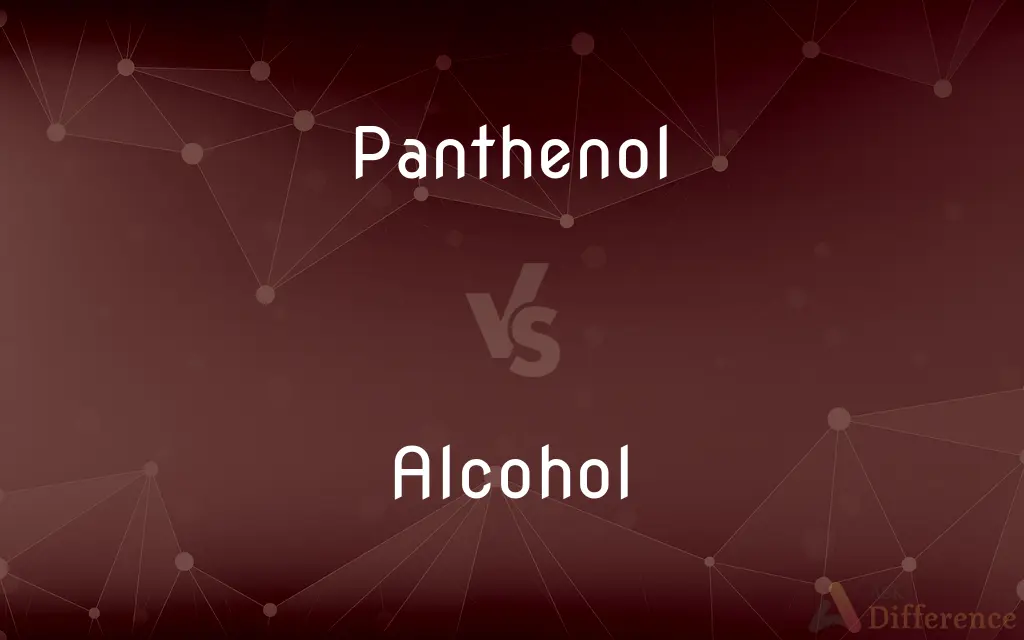Panthenol vs. Alcohol — What's the Difference?
By Maham Liaqat & Urooj Arif — Updated on May 3, 2024
Panthenol is a moisturizing agent used in skin and hair products for hydration, while alcohol in skincare can act as a preservative, solvent, and can have drying effects.

Difference Between Panthenol and Alcohol
Table of Contents
ADVERTISEMENT
Key Differences
Panthenol, also known as provitamin B5, is widely used in cosmetics for its ability to attract and retain moisture. Alcohol, on the other hand, is used in skincare and haircare products primarily as a solvent and to enhance the penetration of other ingredients.
While panthenol is celebrated for its soothing and healing properties, particularly in skin repair and strengthening hair, alcohol can sometimes lead to dryness and irritation, especially in sensitive skin types. However, not all alcohols are detrimental; fatty alcohols like cetyl alcohol are actually beneficial for the skin.
Panthenol is often found in formulations aimed at nourishing and moisturizing, including conditioners, moisturizers, and healing ointments. Alcohol, especially types like SD alcohol or denatured alcohol, is found in products requiring quick drying, such as toners and hand sanitizers.
In terms of benefits, panthenol converts to vitamin B5 in the skin, aiding in regenerative processes and improving skin barrier function. Alcohol, particularly in small amounts, can act as an effective preservative in cosmetics, preventing the growth of microbes.
Both ingredients serve distinct purposes in personal care products: panthenol for hydration and protection, and alcohol for preservation and product texture. However, their impacts vary significantly depending on the product formulation and skin type of the user.
ADVERTISEMENT
Comparison Chart
Primary Use
Moisturizer, skin healer
Solvent, preservative, astringent
Benefits
Hydrates, soothes, strengthens hair and skin
Increases product penetration, acts as antiseptic
Common Products
Creams, lotions, conditioners
Toners, cleansers, sanitizers
Impact on Skin
Soothing, hydrating
Can be drying or irritating
Suitable for Skin Type
All, especially dry and damaged skin
Depends on alcohol type; not for dry/sensitive skin
Compare with Definitions
Panthenol
A derivative of vitamin B5, used as a moisturizer in cosmetics.
Look for panthenol in the ingredients list if you want a hydrating face cream.
Alcohol
Can act as an antiseptic in sanitizing products.
Hand sanitizers contain alcohol to kill bacteria and viruses effectively.
Panthenol
An agent that helps to strengthen hair and reduce breakage.
This shampoo contains panthenol to enhance hair texture and growth.
Alcohol
May cause dryness or irritation, especially in higher concentrations.
Avoid skincare products with high alcohol content if you have sensitive skin.
Panthenol
A substance that improves skin hydration and elasticity.
Panthenol is included in this lotion for its skin-softening properties.
Alcohol
Sometimes used to enhance the texture and feel of skincare products.
The alcohol in this toner helps it dry quickly on the skin.
Panthenol
Known for its role in skin healing and regeneration.
Panthenol is effective in treating mild skin irritations and sunburn.
Alcohol
Includes varieties that are beneficial, like cetyl and stearyl alcohol, which are fatty alcohols.
Cetyl alcohol is included in this cream to help smooth and soften the skin.
Panthenol
Commonly used in pharmaceuticals and cosmetics for its beneficial properties.
Panthenol is a key ingredient in many over-the-counter soothing balms.
Alcohol
A volatile liquid used as a solvent and preservative in cosmetics.
Alcohol in this cleanser helps to dissolve oils and remove impurities.
Panthenol
Panthenol (also called pantothenol) is the alcohol analog of pantothenic acid (vitamin B5), and is thus a provitamin of B5. In organisms, it is quickly oxidized to pantothenic acid.
Alcohol
In chemistry, alcohol is an organic compound that carries at least one hydroxyl functional group (−OH) bound to a saturated carbon atom. The term alcohol originally referred to the primary alcohol ethanol (ethyl alcohol), which is used as a drug and is the main alcohol present in alcoholic drinks.
Panthenol
(organic compound) The alcohol analogue of pantothenic acid, which is quickly oxidized to pantothenate in organisms.
Alcohol
A colourless volatile flammable liquid which is produced by the natural fermentation of sugars and is the intoxicating constituent of wine, beer, spirits, and other drinks, and is also used as an industrial solvent and as fuel
The use of petrol containing alcohol
It is an offence to drive if you have more than 80 mg of alcohol per 100 ml of blood
Alcohol
Any of a series of hydroxyl compounds, the simplest of which are derived from saturated hydrocarbons, have the general formula CnH2n+1OH, and include ethanol and methanol.
Alcohol
A colorless volatile flammable liquid, C2H5OH, synthesized or obtained by fermentation of sugars and starches and widely used, either pure or denatured, as a solvent and in drugs, cleaning solutions, explosives, and intoxicating beverages. Also called ethanol, ethyl alcohol, grain alcohol.
Alcohol
Intoxicating beverages containing ethanol considered as a group
The national consumption of alcohol.
Alcohol
Any of a class of organic compounds (such as ethanol) containing a hydroxyl functional group (-OH).
Alcohol
(colloquial) Ethanol.
Alcohol
(uncountable) Beverages containing ethanol, collectively.
Alcohol
(obsolete) Any very fine powder.
Alcohol
An impalpable powder.
Alcohol
The fluid essence or pure spirit obtained by distillation.
Alcohol
Pure spirit of wine; pure or highly rectified spirit (called also ethyl alcohol or ethanol, CH3.CH2.OH); the spirituous or intoxicating element of fermented or distilled liquors, or more loosely a liquid containing it in considerable quantity. It is extracted by simple distillation from various vegetable juices and infusions of a saccharine nature, which have undergone vinous fermentation.
Alcohol
A class of compounds analogous to vinic alcohol in constitution. Chemically speaking, they are hydroxides of certain organic radicals; as, the radical ethyl forms common or ethyl alcohol (C2H5.OH); methyl forms methyl alcohol (CH3.OH) or wood spirit; amyl forms amyl alcohol (C5H11.OH) or fusel oil, etc.
Alcohol
A liquor or brew containing alcohol as the active agent;
Alcohol (or drink) ruined him
Alcohol
Any of a series of volatile hydroxyl compounds that are made from hydrocarbons by distillation
Common Curiosities
Can panthenol irritate the skin?
Panthenol is generally well-tolerated and is known for its soothing properties.
Are there any alcohols good for the skin?
Yes, fatty alcohols like cetyl and stearyl alcohol are moisturizing and beneficial for the skin.
Is alcohol harmful to the skin?
Some types of alcohol, like denatured alcohol, can be drying and irritating, particularly to sensitive skin.
How do alcohols enhance the penetration of skincare products?
Alcohols can thin the product and decrease the surface tension, allowing it to spread and absorb more easily.
How does panthenol benefit the hair?
Panthenol helps to moisturize hair, reduce breakage, and improve texture.
What is panthenol used for in cosmetics?
Panthenol is used to hydrate and heal the skin and hair.
Can both panthenol and alcohol be used in hair care products?
Yes, panthenol is used for hydration and strengthening, while alcohols can be used for cleansing and quick-drying effects.
Why is alcohol included in skincare products?
Alcohol acts as a solvent, preservative, and can improve product texture.
What is the difference between panthenol and vitamin B5?
Panthenol is a derivative of vitamin B5 and converts into it upon application to the skin.
What products commonly contain panthenol?
Panthenol is commonly found in moisturizers, conditioners, and wound-healing formulations.
Can alcohol be avoided in skincare?
Yes, there are many alcohol-free options available that use alternative solvents and preservatives.
What are the long-term effects of using products with high alcohol content?
Long-term use of high alcohol content products can lead to chronic dryness, irritation, and potential disruption of the skin barrier.
What should I look for in alcohol-free products?
Look for terms like 'alcohol-free' or 'non-drying' on the product label, especially if you have sensitive or dry skin.
What are the signs of alcohol irritation on the skin?
Signs include redness, dryness, and a tightening sensation in the skin.
Is panthenol safe for all skin types?
Yes, panthenol is safe and beneficial for all skin types, especially for dry and damaged skin.
Share Your Discovery

Previous Comparison
Bastardised vs. Bastardized
Next Comparison
Theft vs. RobberyAuthor Spotlight
Written by
Maham LiaqatCo-written by
Urooj ArifUrooj is a skilled content writer at Ask Difference, known for her exceptional ability to simplify complex topics into engaging and informative content. With a passion for research and a flair for clear, concise writing, she consistently delivers articles that resonate with our diverse audience.
















































